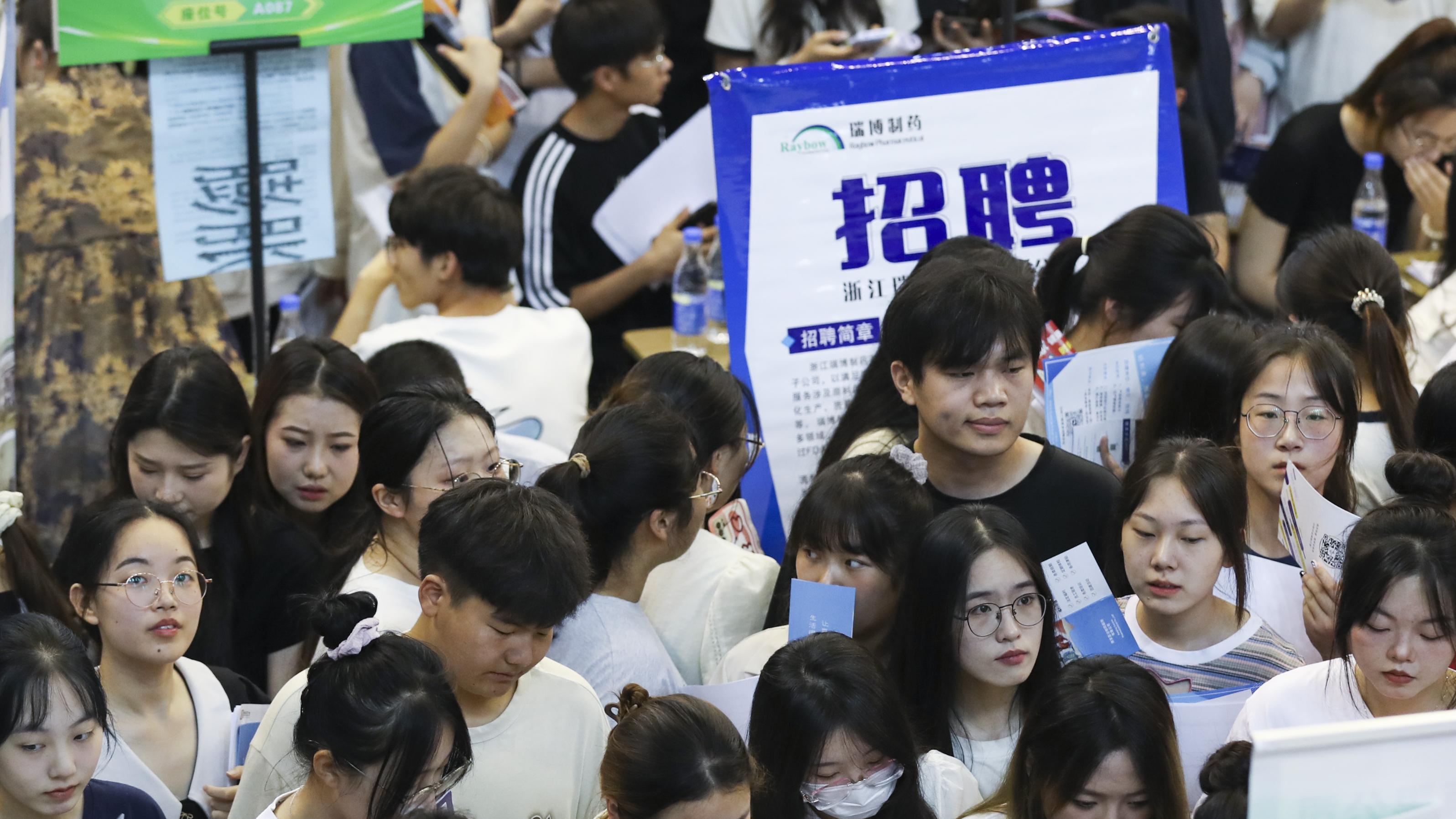July 19, 2023, 7:51 AM
July 19, 2023, 7:51 AM

Exhausted and overworked, Julie quit her job as a game developer in Beijing last April to become a “full-time daughter.”
At 29, she now spends her days washing dishes, preparing food for her parents, and completing other household chores.
Her parents pay most of her expenses, but Julie turned down her $280 monthly offer.
His current priority, after all, is taking a breather from the 16-hour days at his old job. “He lived like a walking corpse.”
Grueling work hours and a troubled job market are forcing unusual decisions on China’s youth.
Julie is part of a growing number of young people calling themselves “full-time kids”who return to the comfort of home because they long for a break from exhausting working lives or simply cannot find work.
Young Chinese have always been told that the hard sacrifice of studying and graduating would be worth it, but now they feel defeated and trapped.
More than one in five young people between the ages of 16 and 24 are out of workaccording to official figures published in May.
The youth unemployment rate in China today is the highest since the authorities began publishing this data in 2018a statistic that does not include the rural labor market.
Many of the so-called “full-time kids” say they expect to be home only temporarily. They see it as a time to relax, reflect and find better jobs. But this is easier said than done.
Julie has applied to over 40 jobs in the last two weeks and only got two calls.
“It was hard to find a job before I quit. Now it’s even harder,” he says.
Exhausted, unemployed or trapped?
The exhaustion that drives these adults to become “full-time children” is not surprising in China given its notoriously poor work-life balance.
The country’s work culture is often referred to as “996,” where many consider it the norm to work 9:00 am to 9:00 pm six days a week.
Chen Dudu, another “full-time daughter,” quit her job in real estate at the beginning of the year because she felt exhausted and undervalued.
The 27-year-old said she had “barely anything left” after paying her rent.
Returning to her parents’ home in southern China, Chen said she has “lived the life of a retiree,” but anxiety has been plaguing her.
He heard two voices in his head: “One says it’s weird to have this leisure, so enjoy the moment. The other urges me to think about what to do next.”
“If that had continued, I would have become a parasite,” says Chen, who has since started his own business.

Jack Zheng, who recently left the Chinese giant Tencent, said that answered almost 7,000 work messages outside of work shift every day. The 32-year-old calls this “invisible overtime” because it was expected but not compensated.
Zheng resigned after stress caused a bad bout of folliculitis, a skin disease in which hair follicles become inflamed.
He’s found work since then, but says many around him aren’t so lucky.
Many face the so-called “Curse of 35”, a prevalent belief in China that employers are less willing to hire workers over the age of 35. Instead, they prefer younger ones that are “less expensive.”
This double-edged sword of ageism and bleak job opportunities is challenging for those in their mid-30s carrying mortgages or planning to start a family.
Hopelessness is not less among young university students. Many purposely fail their exams to delay graduation.
In recent weeks, Chinese social media has been flooded with atypical graduation photos that speak of the disappointment of recent graduates. Some show young men “lying down” in graduation gowns and caps covering their faces; others show them holding their graduation certificates over trash cans, ready to throw them away.
The university was once a place for the elite in China. But between 2012 and 2022, enrollment rates rose from 30% to 59.6% as more young people viewed college degrees as a ticket to better opportunities in a competitive job market.
However, aspirations turn to disappointment as the job market plummets. Experts say that youth unemployment is likely to worsen as a record 11.6 million new graduates enter the market.
“The situation is pretty bad. People are tired and many are trying to opt out. There is a lot of desperation,” said Miriam Wickertsheim, director of Shanghai-based recruitment firm Direct HR.
China’s slower-than-expected economic recovery after Covid is a key reason for high unemployment, says Bruce Pang, chief economist for Greater China at Jones Lang LaSalle.

Some employers are also less willing to hire “blank résumé” graduates with less work experience than their predecessors due to pandemic lockdowns, Pang adds.
Recent Chinese government crackdowns on industries popular with young Chinese professionals have also stifled the job market.
Regulations against major tech companies, restrictions on the tutoring industry and a ban on foreign investment in private education have led to job cuts.
“Slow Employment”
Although the Chinese government is aware of these problems, it has tried to minimize them.
In May, President Xi Jinping was quoted on the front page of a Chinese Communist Party newspaper urging young people to “eat bitterness,” a Mandarin translation meaning endure hardship.
Meanwhile, state media have taken it upon themselves to redefine unemployment.
An editorial last week in the state newspaper Economic Dailyused the term “slow employment”: while some Chinese youth are unemployed, the paper said, others “have actively opted for slow employment.”
The origins of the phrase are unclear, but a 2018 article from the Chinese Youth Daily said that a growing number of college graduates were taking their time finding jobs, and many chose to travel or teach for short periods. This, the Chinese were told, was “slow employment.”
This time, the definition includes those who have not found work or who choose to continue their education, learn new skills or take a gap year.
No matter how tough the job market is, the newspaper advised citizens to “take action and work hard,” and as long as they do that, they need not worry about being out of a job.

However, given the current state of the job market, the phrase and advice have not been well received. Some marveled at his government’s “refusal to acknowledge the unemployment situation,” while others reacted sarcastically.
“Chinese writing is so deep,” wrote one user on Weibo, China’s Twitter-like service.
“Obviously we are unemployed, but [los funcionarios han] invented the term ‘slow employment’. How slow would it be? A few months or a few years?”
Another user of Xiaohongshu, the Chinese equivalent of Instagram, said that the term “throws the burden on young people all of a sudden.”
“According to this explanation, the employment rate during the Great Depression in the US in the late 1920s should be 100%, since most people were in slow employment. What a way to solve a problem global!”
“Unemployment is unemployment. We should call it what it issaid Nie Riming, a researcher at the Shanghai Institute of Finance and Law.
“Indeed, there may be young people who would like a gap year before starting their next job, but I think the vast majority of today’s unemployed are desperate for a job but can’t find one.”
Additional reporting by Fan Wang in Singapore.

Remember that you can receive notifications from BBC Mundo. Download the new version of our app and activate them so you don’t miss out on our best content.
















